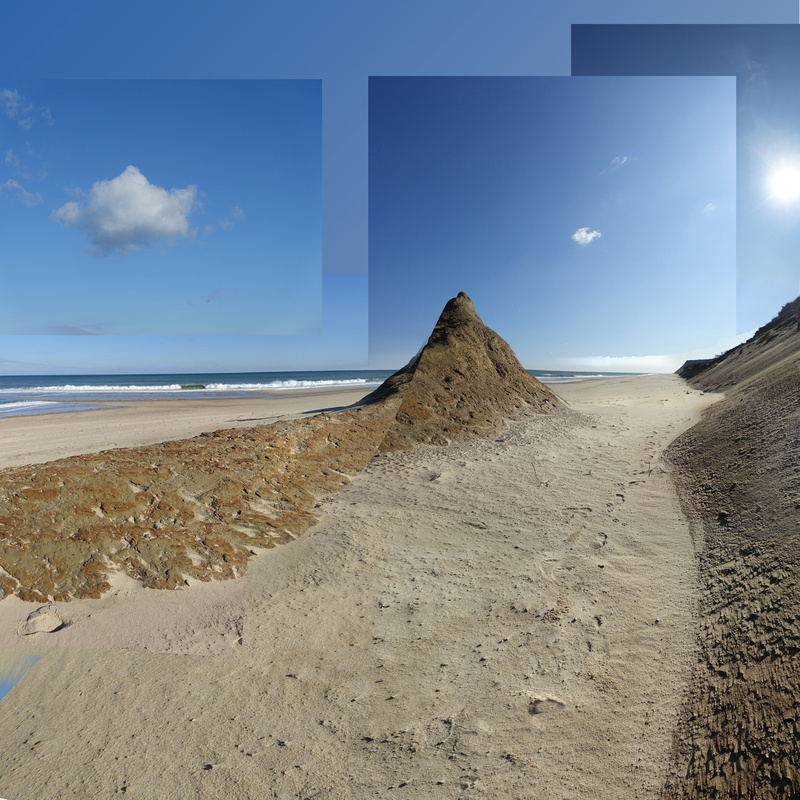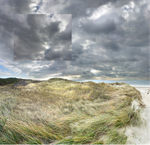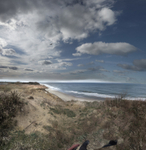Mirage, Cape Cod (#6)

On his visits to Cape Cod Thoreau walked the shoreline and became conversant with its ways. His observations speak inadvertently or directly to the gap between the Cape landscape and the one he traversed in Concord.
Thoreau points out that on the beach objects he sees from a distance appear large, but their scale is diminished at close range. In the Plains of Nauset Chapter, he writes: "A solitary traveler whom we saw perambulating in the distance loomed like a giant. ... Men and boys would have appeared alike at a little distance, there being no object by which to measure them. Indeed to an inlander the cape landscape is a constant mirage."
As a beach walker, I have experienced this scale shifting as part of the terrain. I may spot rocks or driftwood from afar and am surprised to find them far less commanding when I am closer. This phenomenon seems to be somewhat elusive and descriptions of it can include the power of the mind to hone in on what is being observed. One can google Ponzo Illusion and other visual "tricks" that defy factual reality. Thoreau includes detailed descriptions of his "mirage" encounters in his Cape essays.
In my photocollage here there are no familiar references for scale. In this vast, abstract setting I am imagining this to be an ancient stone burial Cairn on the plains of Egypt. But upon closer examination or viewing from a different direction, it may reduce to a small, lumpy mass. The approach from a distance enhances the impression in the mind and imagination. And these impressions are constantly shifting with every step taken. As an artist, I may favor what my mind chooses to remember.
Thoreau's detailed visual observations seem to mingle with my perceptions of space and scale, and a melting of fact into fantasy which seems to occur more readily in this landscape where the horizon line is there to bend.
Thoreau certainly was an artist with words, and I can imagine him finding a rustic Cape cottage and taking up easel painting or photography in his " third act." -- -- Or is the sun in my eyes?
Thoreau points out that on the beach objects he sees from a distance appear large, but their scale is diminished at close range. In the Plains of Nauset Chapter, he writes: "A solitary traveler whom we saw perambulating in the distance loomed like a giant. ... Men and boys would have appeared alike at a little distance, there being no object by which to measure them. Indeed to an inlander the cape landscape is a constant mirage."
As a beach walker, I have experienced this scale shifting as part of the terrain. I may spot rocks or driftwood from afar and am surprised to find them far less commanding when I am closer. This phenomenon seems to be somewhat elusive and descriptions of it can include the power of the mind to hone in on what is being observed. One can google Ponzo Illusion and other visual "tricks" that defy factual reality. Thoreau includes detailed descriptions of his "mirage" encounters in his Cape essays.
In my photocollage here there are no familiar references for scale. In this vast, abstract setting I am imagining this to be an ancient stone burial Cairn on the plains of Egypt. But upon closer examination or viewing from a different direction, it may reduce to a small, lumpy mass. The approach from a distance enhances the impression in the mind and imagination. And these impressions are constantly shifting with every step taken. As an artist, I may favor what my mind chooses to remember.
Thoreau's detailed visual observations seem to mingle with my perceptions of space and scale, and a melting of fact into fantasy which seems to occur more readily in this landscape where the horizon line is there to bend.
Thoreau certainly was an artist with words, and I can imagine him finding a rustic Cape cottage and taking up easel painting or photography in his " third act." -- -- Or is the sun in my eyes?

|















